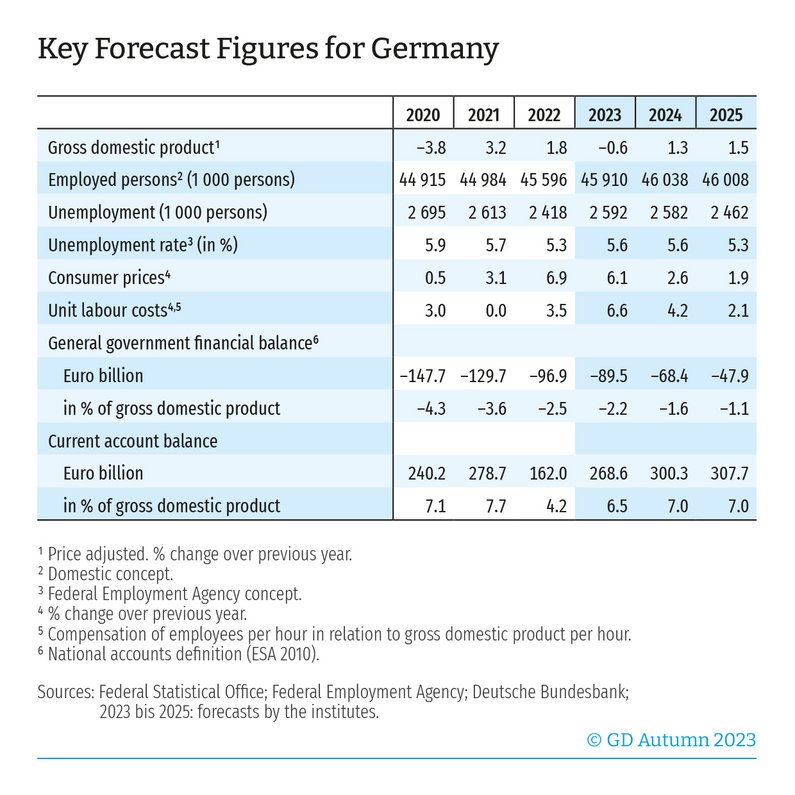Purchasing power returns ‒ political uncertainty high
Business sentiment has recently deteriorated again, not least because of heightened political uncertainty. Overall, the indicators suggest that production fell again noticeably in the third quarter of 2023. However, wage increases have meanwhile followed the price hike, energy prices have fallen, and exporters have partially passed on their higher costs, so that purchasing power is returning. Therefore, the downturn is expected to subside by the end of the year, and the degree of capacity utilisation will rise again going forward.
The institutes’ forecast of 1.3% for 2024 is only 0.2 percentage points below their spring forecast. In the following years, a decreasing potential growth rate due to the shrinking labour force will become more and more apparent.
The downturn has meanwhile reached the labour market. However, the institutes expect only a moderate increase in unemployment to 2.6 million people in 2023. In the coming year, the number of unemployed will probably decrease somewhat.
On the price front, the situation is gradually easing. The inflation rate is expected to be 6.1% in 2023 and to decline to 2.6% in 2024. The institutes see core inflation (inflation excluding energy prices) at 6.1% in the current year and 3.1% in 2024.
The full-length version of the report is available at www.gemeinschaftsdiagnose.de/category/
gutachten/.
About the Joint Economic Forecast
The Joint Economic Forecast is published twice a year on behalf of the Federal Ministry for Economic Affairs and Climate Action. The following institutes participated in the autumn report 2023:
- German Institute for Economic Research (DIW Berlin)
- ifo Institute – Leibniz Institute for Economic Research at the University of Munich in cooperation with the Austrian Institute of Economic Research (WIFO) Vienna
- Kiel Institute for the World Economy (IfW Kiel)
- Halle Institute for Economic Research (IWH) – Member of the Leibniz Association
- RWI – Leibniz Institute for Economic Research in cooperation with the Institute for Advanced Studies Vienna
Scientific contacts
Professor Dr Oliver Holtemöller
Halle Institute for Economic Research (IWH) – Member of the Leibniz Association
Tel +49 345 7753 800
Oliver.Holtemoeller@iwh-halle.de
Dr Geraldine Dany-Knedlik
German Institute for Economic Research (DIW Berlin)
Tel +49 30 89789 486
Professor Dr Timo Wollmershäuser
ifo Institute – Leibniz Institute for Economic Research at the University of Munich
Tel +49 89 9224 1406
Professor Dr Stefan Kooths
Kiel Institute for the World Economy (IfW Kiel)
Tel +49 431 8814 579 oder +49 30 2067 9664
Professor Dr Torsten Schmidt
RWI – Leibniz Institute for Economic Research
Tel +49 201 8149 287
